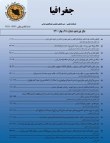Analysis of the Factors Affecting the Success of Ecolodge Business (Case study: Southeastern counties of Isfahan Province)
The ecolodges are among the tourism services, especially in the nature tourism areas and villages. The ecolodges are small-scale businesses whose principles are native design and architecture, cooperative and family management, and provision of local services and products. The ecolodge is an opportunity-creating part of the world's tourism business, which is growing rapidly (Kwan et al., 2008). The ecolodges play a significant role in attracting tourists and developing tourism. Their success and desired performance will have a positive effect on the development of destination tourism and tourist satisfaction. The success of the business of ecolodges due to unique dimensions and features and the emphasis on sustainability requires attention to several underlying factors, and the success of the ecolodge business depends on the recognition and application of these factors by the owners and managers. Therefore, it is necessary to identify the factors affecting the success and sustainability of the ecolodge business to develop and operate optimum solutions and actions for the success of the ecolodge business. The case study is the ecolodges in southeastern counties of Isfahan province, including Isfahan, Jarqouye, Varzaneh, and Kuhpayeh. The study area is one of the most important tourist destinations with a high potential to attract tourists. Also, the area has a high number of ecolodges and ecolodges are one of the important businesses in the study area. The study aims to investigate factors and indicators affecting the success of the ecolodge business in southeastern counties of Isfahan province, including Isfahan, Jarqouye, Varzaneh, and Kuhpayeh.
The research method is a descriptive-analytical type carried out by a survey method. The study area is Isfahan county, which has many of ecolodges and is one of the essential tourism businesses in this county. The statistical population of this study consisted of the owners, managers, and senior staff of the ecolodges in the study area. Due to the limited number of ecolodges in Isfahan county, a census method was used, and the opinions of all 75 managers and senior staff of 34 ecolodges were examined. A researcher-designed questionnaire was used for data collection. First, with the literature review, the indicators affecting the success of the business of ecolodges were identified and categorized into three dimensions: ‘external facilitators’, ‘management and planning innovations’, and ‘operational sustainability practices’. Questionnaire items were measured using a five-point Likert scale from completely disagree (1) to completely agree (5). After applying experts' opinions, the final questionnaire was developed and used for data collection. Before the final field data collection process, a pilot study was conducted on 15 people from the sample population (20% of the total sample). Cronbach’s alpha was used to estimate the reliability of the questionnaire. The value of Cronbach’s alpha for all variables of external facilitators 0.786), management and planning innovations (0.836), operational sustainability practices (0.792,) and the success of the business of ecolodges (0.747) were higher than the recommended threshold of 0.7. For data analysis, SPSS and descriptive (percentage, and mean), and inferential statistical methods (regression, one-sample t-test, ANOVA, and Duncan) were used.
Linear regression model and Enter method were used to predict changes in the dependent variable based on three independent variables. The value of the correlation coefficient (R) is equal to 0.796, which indicates a strong correlation between the set of independent variables and the dependent variable. Also, the value of the adjusted R square coefficient is equal to 0.615, which indicates that 61.5% of the changes in the success of the ecolodge business in the study area are subject to the changes in external facilitators, management and planning innovations and operational sustainability practices. The variable ‘operational sustainability practices’ has the most significant impact on the success of the ecolodge business of Isfahan county. The beta value is 0.355, which is statistically significant at an error level of less than 0.01 (Sig=0.000). Using the path analysis model, the indirect effects of the variables on the success of the ecolodge business were measured. Variables of ‘external facilitators’ and ‘management and planning innovations’ have an indirect effect on the success of the ecolodge business. ‘External facilitators’ from two indirect paths and ‘management and planning innovations’ from an indirect path have affected the success of the ecolodge business. To evaluate the factors affecting the success of the ecolodge business, the one-sample t-test was used. As shown in Table 7, all factors affect the success of the ecolodge business, so the average of all factors is higher than the test value (3). The value of the t-test statistic is also significant at alpha level of 0.05 (Sig=0.000) for all factors. Therefore, at the confidence level of 95%, it can be accepted that all the investigated factors are influential in the success of the ecolodge business. Also, the factor of ‘financial support (M=4.60)’ is the most important factor. Next, the factors of ‘human resources (M= 4.49), and ‘knowledge of the state of the tourism and business market (M= 4.44)’, have been the most important factors affecting the success of the ecolodge business.
The findings indicate that all three variables of ‘external facilitators’, ‘management and planning innovations’, and ‘operational sustainability practices’ have a significantly positive influence on the success of the ecolodge business. Variable of ‘operational sustainability practices’ has the most significant effect on the success of the ecolodge business. For optimum performance, ecolodges should focus on indicators that improve
the level of sustainability, such as the optimum use of resources, and reducing waste production, so that they can attract tourists. The findings show that the variable of ‘external facilitators’ has the greatest effect directly and indirectly through the two variables of ‘management and planning innovations’ and ‘operational sustainability practices’ in the success of the ecolodge business. External facilitators, including financial and non-financial support, laws and regulations, training and local infrastructure can be effective in increasing the success of the ecolodge business by influencing the better implementation of the sustainability practices, and adopting effective measures in planning for the ecolodge. In general, the results show that the success of the ecolodge business depends on the optimum performance of all three sectors. At the macro level, planners and officials in the field of ecolodges should provide facilities necessary for the success of owners. Also, the managers and owners should implement all business principles of ecolodges to attract and satisfy more tourists. For the management and planning, they should know all the principles and criteria necessary for the desired performance and use all the capacities available outside the organization for better performance.
- حق عضویت دریافتی صرف حمایت از نشریات عضو و نگهداری، تکمیل و توسعه مگیران میشود.
- پرداخت حق اشتراک و دانلود مقالات اجازه بازنشر آن در سایر رسانههای چاپی و دیجیتال را به کاربر نمیدهد.



